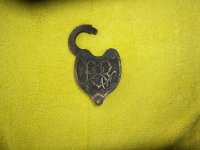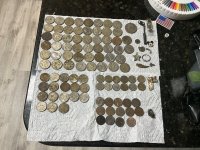Rich jaws
Jr. Member
Have been doing a lot of detecting the past couple of months and have found a lot of clad and some silver and gold jewelry. Have found two large cent pieces and a number of wheats but no pre 1964 silver coins. Of course it depends on the type of soil, conditions, rainfall, temperature, etc. but does anyone else wonder what the sink rate of items would be in the soils they normally search. Just trying to understand the physics a little. It is a fascinating hobby metal detecting.
Upvote
0



 Is it possible that a coin (in that top 10") could conduct heat more rapidly to the frozen soil directly underneath it, allowing it to "settle" before the adjacent soil warms enough to collapse and fill any void beneath the coin??
Is it possible that a coin (in that top 10") could conduct heat more rapidly to the frozen soil directly underneath it, allowing it to "settle" before the adjacent soil warms enough to collapse and fill any void beneath the coin??


